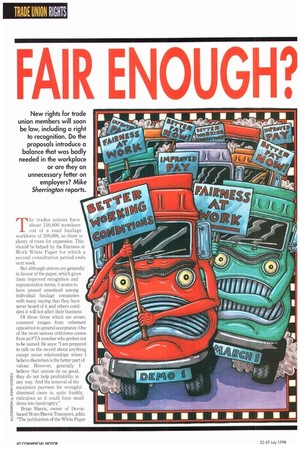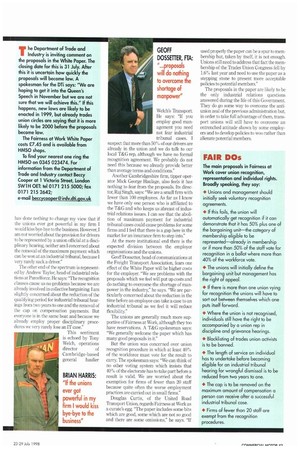FAIR ENOUGH?
Page 44

Page 45

If you've noticed an error in this article please click here to report it so we can fix it.
New rights for trade union members will soon be law, including a right to recognition. Do the proposals introduce a balance that was badly needed in the workplace or are they an unnecessary fetter on employers? Mike Sherrington reports.
he Department of Trade and Industry is inviting comment on the proposals in the White Paper. The closing date for this is 31 July. After this it is uncertain how quickly the proposals will become law. A spokesman for the DTi says: "We are hoping to get it into the Queen's Speech in November but we are not sure that we will achieve this." If this happens, new laws are likely to be enacted in 1999, but already trades union circles are saying that it is more likely to be 2000 before the proposals become law.
The Fairness at Work White Paper costs £7.45 and is available from HMSO shops.
To find your nearest one ring the HMSO on 0345 023474. For information from the Department of Trade and Industry contact Beccy Cooper at 1 Victoria Street, London SW1H OET: tel 0171 215 5000; fax 0171 2152642; e-mail beccycooper@irdv.dti.gov.uk
The trades unions have about 150,000 members out of a road haulage workforce of 500,000, so there is plenty of room for expansion. This should be helped by the Fairness. at Work White Paper for which a second consultation period ends next week.
But although unions are generally in favour of the paper, which gives them improved recognition and representation terms, it seems to have passed unnoticed among individual haulage companies with many saying that they have never heard of it and others confident it will not affect their business.
Of those firms which are aware, comment ranges from vehement opposition to general acceptance. One of the most serious criticisms comes from an PTA member who prefers not to be named. He says: "I am prepared to talk on the record about anything except union relationships where I believe discretion is the better part of valour. However, generally I believe that unions do no good, they do not help profitability in
.., any way. And the removal of the
z maximum payment for wrongful 6 dismissal cases is, quite frankly,
_,ridiculous as it could force small
6 firms into bankruptcy" 2 Brian Harris, owner of DevonbasedBrian Harris Transport, adds: al "The publication of the White Paper
has done nothing to change my view that if the unions ever got powerful in my firm I would kiss bye-bye to the business. However,I am not worried about the provision for drivers to be represented by a union official at a disciplinary hearing, neither am I concerned about the removal of the maximum payment which can be won at an industrial tribunal, because! very rarely sack a driver."
The other end of the spectrum is represented by Andrew Taylor, head of industrial relations at Parcelforce. He says: "The recognition clauses cause us no problems because we are already involved in collective bargaining. Jam slightly concerned about the reduction of the qualifying period for industrial tribunal hearings from two years to one and the removal of the cap on compensation payments. But everyone is in the same boat and because we already employ proper disciplinary procedures we very rarely lose an IT case."
This sentiment is echoed by Tony Welch, operations director of Cambridge-based general haulier Welch's Transport. He says: "If you employ good management you need not fear industrial tribunal cases. I suspect that more than 50% of our drivers are already in the union and we do talk to our local T&G rep, although we have no formal recognition agreement. We probably do not need this because we already provide better than average terms and conditions."
Another Cambridgeshire firm, tipper operator Mick George Haulage, also feels it has nothing to fear from the proposals. Its director, Raj Singh, says: "We are a small firm with fewer than 100 employees. As far as I know we have only one person who is affiliated to the T&G and who keeps us abreast of industrial relations issues. I can see that the abolition of maximum payment for industrial tribunal cases could cause problems for some firms and I feel that there is a gap here in the market for an insurance firm to step into."
At the more institutional end there is the expected division between the employer organisations and the unions.
Geoff Dossetter, head of communications at the Freight Transport Association, fears one effect of the White Paper will be higher costs for the employer. "We see problems with the proposals which we feel will put up costs and do nothing to overcome the shortage of manpower in the industry," he says. "We are particularly concerned about the reduction in the time before an employee can take a case to an industrial tribunal as we feel it will reduce flexibility."
The unions are generally much more supportive of Fairness at Work, although they too have reservations. A T&G spokesman says: "We generally welcome the paper which has many good proposals in it."
But the union was concerned over union recognition procedure in which at least 40% of the workforce must vote for the result to carry. The spokesman says: "We can think of no other voting system which insists that 40% of the electorate has to take part before a result is valid. We are worried about the exemption for firms of fewer than 20 staff because quite often the worse employment practices are carried out in small firms."
Douglas Curtis, of the United Road Transport Union, regards Fairness at Work as a curate's egg. "The paper includes some bits which are good, some which are not so good and there are some omissions," he says. "If used properly the paper can be a spur to membership but, taken by itself, it is not enough. Unions still need to address that fact the membership of the Trades Union Congress fell by 1.6% last year and need to use the paper as a stepping stone to present more acceptable policies to potential members."
The proposals in the paper are likely to be the only industrial relations questions answered during the life of this Government. They do go some way to overcome the antiunion zeal of the previous administration but, in order to take full advantage of them, transport unions will still have to overcome an entrenched attitude shown by some employers and to develop policies to woo rather than alienate potential members.
FAIR DOs
The main proposals in Fairness at Work cover union recognition, representation and individual rights. Broadly speaking, they say: • Unions and management should initially seek voluntary recognition agreements.
• If this fails, the union will automatically get recognition if it can demonstrate that it has plus one of the bargaining unit—the category of membership eligible to be represented already in membership or if more than 50% of the staff vote for recognition in a ballot where more than 40% of the workforce vote.
• The unions will initially define the bargaining unit but management has the right of appeal.
• If there is more than one union vying for recognition the unions will have to sort out between themselves which one puts itself forward.
• Where the union is not recognised, individuals still have the right to be accompanied by a union rep in discipline and grievance hearings.
• Blacklisting of trades union activists is to be banned.
• The length of service an individual has to undertake before becoming eligible for an industrial tribunal hearing for wrongful dismissal is to be reduced from two years to one.
• The cap is to be removed on the maximum amount of compensation a person can receive after a successful industrial tribunal case • Firms of fewer than 20 staff are exempt from the recognition procedures.




































































































